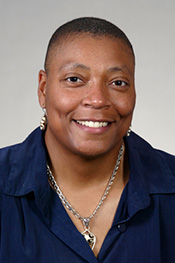OVPDEMA: What was your path to researching mentorship for students from underserved communities?
Dr. Smith: I grew up in the inner city of Milwaukee, so I come from a low-income, under-resourced background from multiple generations of poverty. I knew my mother and my grandmother had high expectations for me, but in terms of going to college and understanding that process, they were not able to assist me. Some of my personal journey was the major motivation behind the research that I do, because I know there are numerous young scholars coming from under-resourced backgrounds, who, if they are provided with a more structured pathway of how to enter college and then to navigate through the land mines of college, they will do well. I was motivated to find ways where we can be intentional of making those pathways more explicit.
OVPDEMA: What motivated you to research how scholars from diverse backgrounds, including first-generation college students, can be successful academically?
Dr. Smith: Sometimes we tell our scholars, ‘Just work hard,’ and we think of it in terms of them completing a particular assignment. But if they don’t know how to even understand the instructions of the assignment, they’re not going to perform at their best. Scholars have to master the content, but they also have to master the ability to go to their professors to find out their expectations to be successful in particular classes. We really have to help scholars understand that they need to have these conversations with all of their professors in order for them to be successful.
You have to build social capital with each of your professors, moving beyond being a survivor in class to a place where you’re actually thriving and have a high-quality relationship—even them asking you to do research with them and when you’re not in the class, they’re thinking about scholarship opportunities for you. The reality for me came when I saw so many bright, hard-working young scholars who were working really hard, but they were not maximizing all of their opportunities. Part of it was they were not understanding all of the expectations, norms, and values that were not written on the syllabus. They were trying to do everything that was written on the syllabus, but there were a lot of things that they were being judged and evaluated on that were not on the syllabus, yet had an impact on their performance in class.


